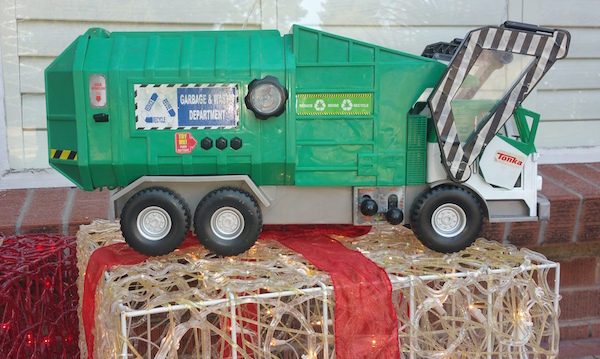
Happiness can be found, even in the darkest of times, if one only remembers to turn on the light. – Harry Potter and the Prisoner of Alkaban
I’m in Florida this week celebrating Christmas with my family. In addition to being a time for rejoicing, since the birth of my own son, the Christmas season has become an opportune time to reflect and to slow down a bit, to take measure of how fast life is going by.
One of my fond memories is of a few years ago when my son found a green toy garbage truck waiting for him under the tree. He absolutely loved garbage trucks and so this was a huge delight. Not long after getting his gift, my son would want me to wait with him outside for the garbage man. He’d bring his toy truck and breakfast, I’d bring my coffee, and we’d just hang out waiting. Upon seeing the garbage man appear down the street, my son would take his truck and run out to the middle of our front yard and proudly hoist it up for the garbage man to see.
There are many lessons I’ve taken from this experience and today I’d like to share one of them.
Along with a third of America, I’m bothered by the commercialism and materialism of the Christmas season. I’m also keenly aware that beyond a certain point, having more things doesn’t lead to more happiness.
Consider for example this 2003 study by L.V. Boven and T. Gilovich in which respondents from various demographic groups indicated that:
Experiential purchases—those made with the primary intention of acquiring a life experience—made them happier than material purchases.
In line with what physicist and professor Richard Feynman (HT Farnam Street) was getting at when he said that:
Wealth is not happiness nor is swimming pools and villas. Nor is great work alone reward, or fame. Foreign places visited themselves give nothing. It is only you who bring to the places your heart, or in your great work feeling, or in your large house place. If you do this there is happiness.
L.V. Boven and T. Gilovich posit that experiences make people happier because:
They are more open to positive reinterpretations, are a more meaningful part of one’s identity, and contribute more to successful social relationships.
Back to the toy garbage truck. When my son first asked me to wait with him, I’m ashamed to say I was somewhat annoyed. Whether he was keeping me from a morning run or some other uncivilized morning routine, I cannot recall. I just know that when he first asked, I felt like I had more important things to do. While heeding every request of our children may not be practical or advisable, on reflection, in this particular case it’s clear to me the important thing was to be out there hanging with my son waiting for the garbage man to arrive.
So here is what I learned: Although the truck was a material thing leading to an experience, it’s important to try and allocate time to share in the very experience the gift can provide. Not only will the return on investment in terms of happiness and memories be far greater but it will also help to inform the types of gifts you give and the number of gifts.
Thinking this way has greatly informed my gift giving. For example, this Christmas I bought my son just one gift, the complete Eight-film Harry Potter movie series. Over the next eight months I plan to watch the series with him during a monthly movie night. Between showings, I intend to spend time working with him on creating projects/activities that are informed by the movie.
The best of Christmases to you and your family and, for those of you who have kids who love garbage trucks as much as my son, I leave you with a video (HT kottke.org) that is sure to put a smile on your face.
In your service…Christian
Video not displaying properly? Click here.








